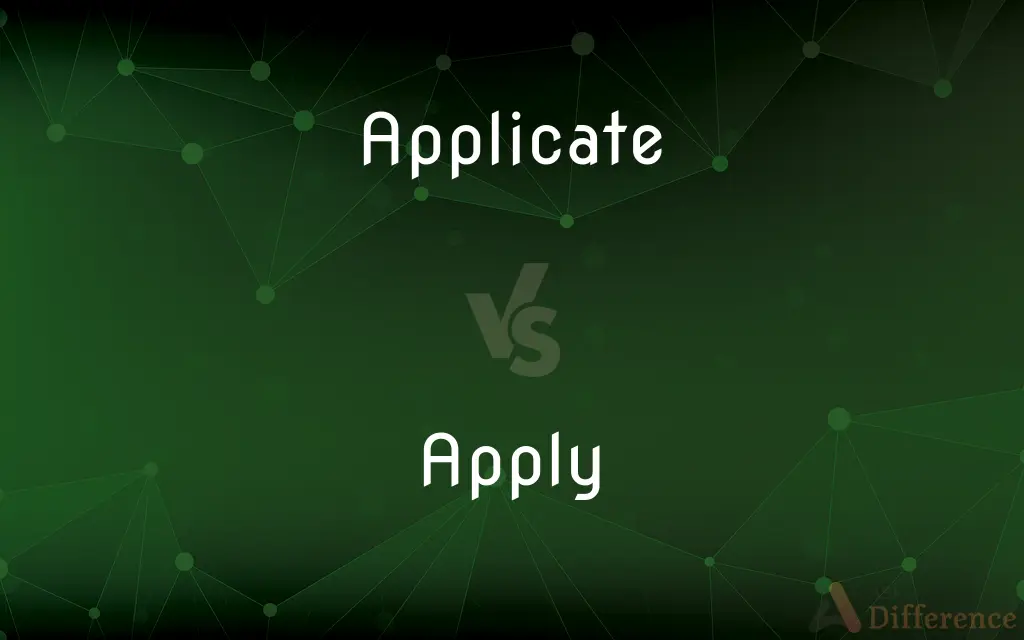Applicate vs. Apply — What's the Difference?
By Maham Liaqat & Urooj Arif — Updated on February 27, 2024
Applicate is a less common term that means to apply or put into practice. Apply is a widely used term referring to the act of putting something into operation or effect, or making a formal request.

Difference Between Applicate and Apply
Table of Contents
ADVERTISEMENT
Key Differences
Applicate, rarely used in modern English, primarily appears in technical or specific contexts where it denotes the action of putting theories or principles into practical use. Its usage is largely overshadowed by the more versatile and commonly understood term "apply."
Apply, on the other hand, encompasses a broad range of meanings, including the act of putting something into practical use, submitting a formal request (e.g., applying for a job), or spreading a substance over a surface. It is a fundamental term in both everyday language and professional discourse, reflecting its versatility and relevance across various contexts.
The distinction between applicate and apply lies not just in their frequency of use but also in the breadth of their meanings. While applicate is narrowly focused on the concept of application in a practical sense, apply spans a wider spectrum of actions, from the practical application of ideas to the process of requesting something formally.
The technical discussions, one might encounter "applicate" as part of specific terminologies or in older texts, where it serves to emphasize the act of application in a narrowly defined context. However, in contemporary usage, "apply" is the preferred term for expressing the concepts of implementation, usage, and request across a variety of settings.
"Apply" is also integral to various phrases and idiomatic expressions, illustrating its embeddedness in the language. For example, applying oneself to a task indicates a commitment to diligently work on it, while applying a concept involves using it in a practical, real-world scenario. This adaptability and broad applicability make "apply" a cornerstone of English vocabulary, unlike the specialized and infrequently used "applicate."
ADVERTISEMENT
Comparison Chart
Definition
To put into practice or use.
To put into operation or effect, submit a request, or spread a substance.
Common Usage
Rare, mostly in technical contexts.
Widely used in various contexts.
Scope
Narrow, focused on practical application.
Broad, includes practical use, requests, and spreading substances.
Examples
"To applicate a theory in a real-world scenario."
"To apply for a job," "apply a theory," or "apply paint to a wall."
Language
Less common, more technical.
Common, versatile, integral to everyday language.
Compare with Definitions
Applicate
(Technical) To make something applicable.
This technique is applicated in various engineering fields.
Apply
To put something into operation or effect.
Apply the brakes gently to stop the car.
Applicate
(Rarely used) To apply formally.
(Usage not common enough for a contemporary example)
Apply
To spread or put on a surface.
Apply the paint evenly across the wall.
Applicate
(Obsolete) Direct application.
(Usage not common enough for a contemporary example)
Apply
To be relevant or applicable.
This rule does not apply to everyone.
Applicate
To put a theory or principle into practical use.
The engineer applicated complex mathematical principles to design the bridge.
Apply
To use a concept or method.
We can apply this theory to solve the problem.
Applicate
(Mathematics) To apply methods or rules.
We will applicate the theorem to solve the equation.
Apply
To make a formal request for something, such as a job.
She applied for the position last week.
Applicate
Having an application; able to be applied; applicable, pertinent, relevant, suitable. Now rare.
Apply
Make a formal application or request
A number of people have applied to vote by proxy
You need to apply to the local authority for a grant
Applicate
To apply or put to use.
Apply
Be applicable or relevant
Normal rules apply
Prices do not apply to public holiday periods
Applicate
To apply (a material to a surface)
Apply
Apply oneself to;
Please apply yourself to your homework
Applicate
(obsolete) Applied or put to some use.
Applicate
Applied or put to some use.
Those applicate sciences which extend the power of man over the elements.
Applicate
To apply.
The act of faith is applicated to the object.
Common Curiosities
Can "applicate" and "apply" be used interchangeably?
While they share similar meanings, "applicate" is more specialized and less commonly used, making "apply" the preferred choice in general contexts.
Is "applicate" commonly used in everyday language?
No, "applicate" is mostly used in technical or mathematical contexts and is less common in everyday language.
Can "apply" be used in formal requests?
Yes, "apply" is often used when making formal requests, such as applying for a job or a grant.
Is there a scenario where "applicate" is preferred over "apply"?
"Applicate" might be preferred in specific academic or technical documents where the term is traditionally used.
Does "apply" have different forms?
Yes, "apply" can be used in different forms, such as applied, applying, and applies, depending on the tense and subject.
Can "apply" refer to physical and abstract concepts?
Yes, "apply" can refer to both physical actions, like applying paint, and abstract concepts, like applying a theory.
Is "apply" suitable for use in academic writing?
Yes, "apply" is suitable and commonly used in academic writing.
Does "applicate" have a noun form?
"Applicate" itself is not commonly used, and its noun form is not established in common usage, unlike "application" from "apply."
Can "apply" be used in a legal context?
Yes, "apply" can be used in legal contexts, as in applying for a patent or applying a law.
Can "apply" indicate eligibility?
Yes, in contexts like "the rule applies to everyone," it indicates who or what is eligible or relevant under certain conditions.
How is "apply" used in technology contexts?
In technology, "apply" is often used to describe the implementation of techniques, methods, or software applications.
Is "applicate" a verb?
Yes, "applicate" is a verb, though less commonly used than "apply."
Are there synonyms for "applicate"?
While not exactly synonyms, terms like "implement" and "utilize" can serve similar purposes in some contexts.
Can "apply" be used in medical contexts?
Yes, "apply" is used in medical contexts, as in applying a bandage or applying a medical technique.
Is it correct to use "apply" when talking about principles or theories?
Yes, it is correct and common to use "apply" when discussing the application of principles or theories to practical situations.
Share Your Discovery

Previous Comparison
Eternity vs. Eternally
Next Comparison
Text vs. TestAuthor Spotlight
Written by
Maham LiaqatCo-written by
Urooj ArifUrooj is a skilled content writer at Ask Difference, known for her exceptional ability to simplify complex topics into engaging and informative content. With a passion for research and a flair for clear, concise writing, she consistently delivers articles that resonate with our diverse audience.















































